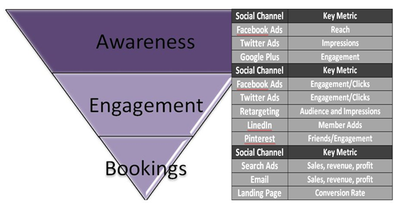October 2014, Berlin
Measure effectiveness: the No.4 element in a super successful marketing campaign
In the past few weeks we’ve looked at ways to raise your marketing game. Now Phil Butler shares tip number 4
So we talked about how to target and retarget, why image is so important and where to spend your marketing budget. Now it’s time to take a look at ways to measure your success. In order to plan for an effective hotel marketing campaign, it’s necessary first to know the desired result. This is backed up by a recent interview with Joshua Sloser, VP Digital Product Innovation at Hilton, who argues that half the battle is clearly defining what you are trying to accomplish for your customers at the start of an initiative, and determining how that result can best be measured.
By establishing the desired result, the hoteliers’ reasons for wanting to infinitely measure the campaign become clear as well. For the sake of brevity and saving space here, please allow me to use a social media measurement metric as an example. You’ll soon find, or maybe you already have, that the tools for accomplishing measurement are as numerous as the stars. It matters less which you use, as long as you use them for the right purposes. Let’s begin with:
1. Determine what your sales path will look like. Using a typical marketing funnel, prioritise from awareness, to engagement, and finally down to bookings
2. Next, prioritise your social media channels according to the tools your potential guests are using. Then further organise these by most effective functionality (eg. leads, direct bookings, and support function, as in Twitter)
3. Now, establish expectations for each channel based on its relevance to your conversion goal.
4. Finally, once you have your funnel built, assign and measure your key metrics (see fig below)

Of course this is only a suggested metrics start for social media primarily, and a simplification, but it’s a good template for starting your test and evaluation metrics. Establishing benchmarks, no matter what the tools or marketing channels, is fundamental to not only running a campaign effectively, but for improving your property’s conversions in the short, mid, and long term. Facebook insights, Google + insights, and etc. these added to Google Analytics for direct website scrutiny help you gain a complete picture.
Finally, Adwords, daily metasearch testing and tweaking, and even monitoring media mentions, if there’s a PR component (which there should be), round out the basics for measurement. If your company employs a marketing team outsourced, you’ll also want to scrutinise closely any responsibilities those services carry, such as PPC management and so on.
The bottom line here is, test, evaluate, test and reevaluate everything associated with your campaigns. In the short term you may feel overwhelmed and less efficient, but in the long run your efficiency and return will increase many times. It’s also worth noting that while social media is more often than not used to create positive buzz about a brand, it’s also a vital tool in times of crisis, as Dean Dacko, Malaysia Airlines SVP of marketing (who will be speaking in Berlin) discovered this year.
A sombre note to end on, but one worth pondering.
Join us in Berlin next month (Oct 1-2) to hear practical, strategic tips and advice, from brands like Malaysia Airlines, Kempinski, Google and Low Cost Travel Group, on how to market successfully in a mobile and social world

